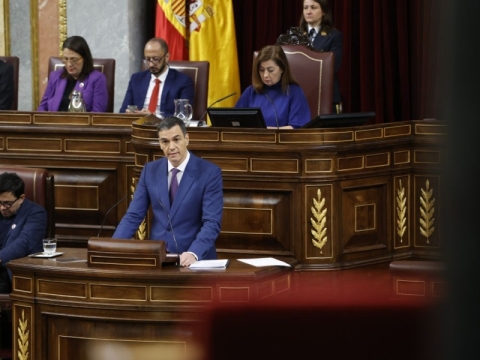Politics
Eight votes give the Presidency of Spain to the socialist Pedro Sánchez
Absolute majority with only eight votes
USPA NEWS -
Never before had a Spanish Prime Minister achieved his investiture with an absolute majority but by only eight votes. A very close result that reflects the complicated political moment that Spain is experiencing, with massive daily demonstrations against the agreements reached by the socialist candidate and acting Prime Minister, Pedro Sánchez, with the Catalan and Basque independentists; with the judiciary and businessmen against the Government; with an opposition that controls 13 of the 17 regions into which Spain are divided and the Senate controlled by the conservatives, and with Europe vigilant that the agreements with the independentists do not violate the sacred principle of equality among Spaniards or endanger the democratic stability of the third economy of the European Union.
Pedro Sánchez achieved it: for the third consecutive time he was inaugurated this Thursday as Prime Minister of Spain. He achieved it by 179 votes – three more than necessary to achieve an absolute majority – compared to 171 for the opposition. Eight votes difference that are worth their weight in gold because they allow the socialist candidate to form a Government, but that anticipate a complicated legislature, in permanent risk and with no guarantees of reaching its end.
In this Thursday's debate in Parliament, the spokesperson for the Catalan independentists warned the socialist candidate: the support of his group will have to be negotiated every day and each agreement they reach "should bring Catalonia a little closer to independence." The pro-independence spokesperson thus confirmed what everyone assumed in Spain and the acting Government did not recognize: that the support of the Catalan independentists demands in return that Madrid facilitate the independence of Catalonia, the breakup of the State and the dismemberment of Spain.
Master of lies, manipulation, demagoguery and mystery, the now Spanish Prime Minister, Pedro Sánchez, assured during the debate of his investiture that the agreements reached with the Catalan and Basque independence movements seek to end the disagreement between Catalonia and the rest from Spain. But he did not explain why four months ago he considered that the amnesty for independence leaders had no place in the Spanish Constitution and today he assures the opposite and considers it a solution to the territorial crisis with Catalonia. Nor did he explain why four months ago he stated that he would return to Spain the president of the regional government of Catalonia who declared independence and who fled to Belgium, Carlos Puigdemont, and now he will receive him with honors and free of all guilt.
For the conservative opposition, it is clear. Pedro Sánchez is obsessed with staying in power and, as he needed the seven votes of the Catalan independentists, he has changed his mind. The candidate himself admitted during the debate this Thursday that his Government will be dependent on the demands of the Basque independentists. “I will listen to all his requests,” he said. The truth is that the Government of Pedro Sánchez's third term will depend on the demands of 6% of parliamentarians, representatives of pro-independence, nationalist and very minority parties.
Despite everything, Sánchez defended his government as democratic, constitutional and focused on the problems of Spanish society. Neither on Wednesday nor this Thursday, the socialist candidate for the investiture explained his government program or gave a state speech. He limited himself to blaming the conservative opposition for Spain's problems and, especially, the territorial crisis in Catalonia. And he put the progressive vision of his Government before the “retrograde” vision of the opposition.
The truth is that the new legislature is born with many doubts. Not only the judges and businessmen, the conservative regions and half of the citizens are against the agreements reached with the Catalan independence movement, the amnesty and the forgiveness of Catalonia's multimillion-euros debt. Europe is also vigilant and next week the Strasbourg Parliament will discuss the Amnesty Law announced by the Spanish Government and the possible risk for democracy in Spain, which risks losing European funds if the Parliament and the Commission conclude that the favors Catalonia places this region in a better position than the rest of the regions.
Liability for this article lies with the author, who also holds the copyright. Editorial content from USPA may be quoted on other websites as long as the quote comprises no more than 5% of the entire text, is marked as such and the source is named (via hyperlink).






